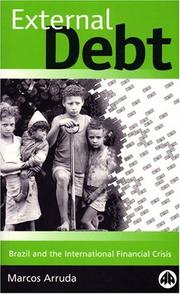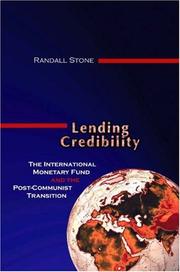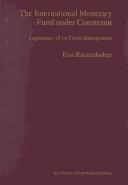| Listing 1 - 10 of 1204 | << page >> |
Sort by
|
Book
Year: 1952 Publisher: Verviers Imprimerie Gérard & C°
Abstract | Keywords | Export | Availability | Bookmark
 Loading...
Loading...Choose an application
- Reference Manager
- EndNote
- RefWorks (Direct export to RefWorks)
Book
Year: 1952 Publisher: Bruxelles Soc. d'économie politique de Belgique
Abstract | Keywords | Export | Availability | Bookmark
 Loading...
Loading...Choose an application
- Reference Manager
- EndNote
- RefWorks (Direct export to RefWorks)
Fonds monétaire international --- Internationaal Monetair Fonds --- 332.431
Book
Year: 1992 Publisher: Bruxelles ISE
Abstract | Keywords | Export | Availability | Bookmark
 Loading...
Loading...Choose an application
- Reference Manager
- EndNote
- RefWorks (Direct export to RefWorks)
Book
ISBN: 1462346227 1452725144 Year: 2005 Publisher: [Place of publication not identified] International Monetary Fund
Abstract | Keywords | Export | Availability | Bookmark
 Loading...
Loading...Choose an application
- Reference Manager
- EndNote
- RefWorks (Direct export to RefWorks)
Finance --- Business & Economics --- International Finance --- International Monetary Fund. --- Internationaal monetair fonds --- International monetary fund
Book
ISBN: 1455291293 1452723125 Year: 2006 Publisher: [Place of publication not identified] International Monetary Fund
Abstract | Keywords | Export | Availability | Bookmark
 Loading...
Loading...Choose an application
- Reference Manager
- EndNote
- RefWorks (Direct export to RefWorks)
Finance --- Business & Economics --- International Finance --- International Monetary Fund. --- Internationaal monetair fonds --- International monetary fund
Book
ISBN: 0191851078 0192542478 0192542486 Year: 2018 Publisher: Oxford : Oxford University Press,
Abstract | Keywords | Export | Availability | Bookmark
 Loading...
Loading...Choose an application
- Reference Manager
- EndNote
- RefWorks (Direct export to RefWorks)
This work explores the IMF's role within the politics of austerity by providing a path-breaking comprehensive analysis of how the IMF approach to fiscal policy has evolved since 2008, and how the IMF worked to alter advanced economy policy responses to the global financial crisis and the Eurozone crisis. It updates our understanding of how the IMF seeks to wield ideational power by analysing the Fund's post-crash their ability to influence what constitutes legitimate knowledge, and their ability fix meanings attached to economic policies within the social process of constructing economic orthodoxy. This text is interested in the politics of economic ideas, focused on the assumptive foundations of different approaches to economic policy, and how the interpretive framework through which authoritative voices evaluate economic policy is an important site of power in world politics.

ISBN: 0745316816 0745316824 1849641005 9781849641005 9780745316826 9780745316819 Year: 2000 Publisher: Sterling, Va. Pluto Press, in association with Christian Aid
Abstract | Keywords | Export | Availability | Bookmark
 Loading...
Loading...Choose an application
- Reference Manager
- EndNote
- RefWorks (Direct export to RefWorks)
Public Finance --- Political Science --- Law, Politics & Government --- Debts, External --- International Monetary Fund --- Brazil --- Economic conditions --- Internationaal monetair fonds --- International monetary fund
Book
ISBN: 0190609508 0190605774 0190605782 Year: 2016 Publisher: New York, NY : Oxford University Press,
Abstract | Keywords | Export | Availability | Bookmark
 Loading...
Loading...Choose an application
- Reference Manager
- EndNote
- RefWorks (Direct export to RefWorks)
'Brother, Can You Spare a Billion?' explores how and why the US has regularly acted, often alongside the IMF, as an international lender of last resort by selectively bailing out foreign economies in crisis. Daniel McDowell highlights the unique role that the US has played in stabilizing the world economy from the 1960s through 2008.

ISBN: 9786613380029 1283380021 1400824435 1400814731 9781400814732 9781400824434 9781283380027 0691095280 9780691095288 0691095299 9780691095295 Year: 2002 Publisher: Princeton, N.J. Princeton University Press
Abstract | Keywords | Export | Availability | Bookmark
 Loading...
Loading...Choose an application
- Reference Manager
- EndNote
- RefWorks (Direct export to RefWorks)
With the end of the Cold War, the International Monetary Fund emerged as the most powerful international institution in history. But how much influence can the IMF exert over fiercely contested issues in domestic politics that affect the lives of millions? In Lending Credibility, Randall Stone develops the first systematic approach to answering this question. Deploying an arsenal of methods from a range of social sciences rarely combined, he mounts a forceful challenge to conventional wisdom. Focusing on the former Soviet bloc, Stone finds that the IMF is neither as powerful as some critics fear, nor as weak as others believe, but that the answer hinges on the complex factor of how much credibility it can muster from country to country. Stone begins by building a formal, game-theoretic model of lending credibility, which he then subjects to sophisticated quantitative testing on original data from twenty-six countries over the 1990's. Next come detailed, interview-based case studies on negotiations between the IMF and Russia, Ukraine, Poland, and Bulgaria. Stone asserts that the IMF has exerted startling influence over economic policy in smaller countries, such as Poland and Bulgaria. However, where U.S. foreign policy interests come more heavily into play, as in Russia, the IMF cannot credibly commit to enforcing the loans-for-policy contract. This erodes its ability to facilitate enduring market reforms. Stone's context is the post communist transition in Europe and Asia, but his findings carry implications for IMF activities the world over.
Post-communism --- International Monetary Fund. --- Internationaal monetair fonds --- International monetary fund --- Europe, Eastern --- Economic conditions --- Economic policy --- International finance --- International Monetary Fund

ISBN: 9041115773 9004479007 Year: 2001 Publisher: The Hague, The Netherlands : Kluwer Law International,
Abstract | Keywords | Export | Availability | Bookmark
 Loading...
Loading...Choose an application
- Reference Manager
- EndNote
- RefWorks (Direct export to RefWorks)
The International Monetary Fund under Constraint exposes a legal dilemma facing the IMF as it tackles international crisis management. Using the Asian crisis - and more particularly economic and political events in Indonesia - as an example, this volume examines whether the Fund's activities in Asia were legally justified. The results of this analysis lead to the following question: What future role can the IMF play in the international financial architecture? The principles of international law and the legal foundations of the Fund are used to analyse the reform suggestions of economic experts and to find a suitable concept for future IMF involvement in financial crises and crises prevention. This volume is a long-overdue legal analysis of IMF activities. It presents the combination of law and economics which was originally at the heart of the IMF but which so far has been ignored in today's reform discussion.
Financial crises --- International finance --- International finance. --- Law and legislation. --- International Monetary Fund. --- International monetary system --- International money --- Finance --- International economic relations --- Internationaal monetair fonds --- International monetary fund
| Listing 1 - 10 of 1204 | << page >> |
Sort by
|

 Search
Search Feedback
Feedback About UniCat
About UniCat  Help
Help News
News